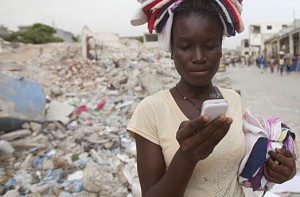How mobile phones can help in disasters
 Francis West is urging for greater cooperation in humanitarian efforts so that technology can make the biggest positive difference possible. In an article in today’s Guardian, the senior advisor of the charity Save the Children, explains how mobile technology isn’t a panacea that will ensure the success of humanitarian projects. Instead, far greater and more effective collaboration is also required to make the most of mobile phones in disaster areas.
Francis West is urging for greater cooperation in humanitarian efforts so that technology can make the biggest positive difference possible. In an article in today’s Guardian, the senior advisor of the charity Save the Children, explains how mobile technology isn’t a panacea that will ensure the success of humanitarian projects. Instead, far greater and more effective collaboration is also required to make the most of mobile phones in disaster areas.
The article is sponsored by Adam Smith International and describes how the potential of mobile phones to make a difference has not yet been fully realised. There is still a lot more work to do to make the most of this technology. A new report funded by Vodafone argues that better cooperation between NGOs, the private sector, governments and charities will make the biggest difference in helping out during disasters.
Francis West explains how mobile phones have made a massive difference in areas such as the fight against cholera. This deadly intestine infection causes over 100,000 deaths a year still and is very common in third world countries with unclean water supplies. Untreated outbreaks often develop into pandemics. In Haiti, a report by the American Journal of Hygiene and Tropical Medicine showed that mobile communications and social media dramatically helped against the spread of the disease when compared to older methods.
Since then, the proliferation of mobile phones in developing countries has helped in other similar instances. Nowadays almost 80% of the developing world have mobile phones. But an important factor that hasn’t been adequately addressed is accountability. In humanitarian work, mobile phones excel as they allow access to instantaneous information assisting in triage and assessing the most pressing needs. Part of this is ensuring that the most vulnerable to actually have access to mobile phones and functional networks. The best solution is to oblige mobile phone companies to divert capacity to the most remote or damaged areas during emergencies and for government bodies to prioritise bringing mobile networks back up in their initial disaster-response plans.
Another important issue for consideration is being prepared. It is vital that sufficient training is in place to make the most of this powerful technology. As communication is so quick and easy with mobile phones, it’s important that people know how to use it in the best possible way. Similarly, it is absolutely imperative that the hierarchical structure is optimised for this. Without preparation, mobile technology can cause even great confusion and an disjointed emergency response. All organisations from the private sector to governments should investigate the appropriate training in advance.
Finally, a charitable spirit and helpful collaboration can make huge differences on the ground. For example, mobile phones are frequently used nowadays to collect and coordinate urgently needed donations as well as distribute money. With advanced coordination of policies for reducing costs such as transfer fees in the wake of a disaster, things can be massively sped up. There is no point having mobiles provide an instant means of communication if discussions for services fees take hours or days to be fleshed out.
What the research shows us best is that mobile phones and technology alone will not improve people’s lives or disaster response on their own. What is also needed is forward-planning and motivation to remove structural and systemic obstacles that still impede good work.
What do you think? Have mobiles revolutionised disaster response and the way we can help in humanitarian disasters? And what more can be done to make their use more efficient?





